When starting your online business, one of the most important decisions you need to make is to decide which type of content creator model suits you and your business.
Wait, what’s a content creator?
Simply put, it’s anyone who creates content.
And content is anything you create and put out there – blog posts, social media posts, podcasts, ebooks, courses, everything.
Your content needs to attract your ideal customers, and show them that you’re the right person to help them.
Therefore, making an intentional decision on your content creator model is essential.
Most people think they need to position themself as an expert. They need to be the all-knowing person who teaches what they know, and always has the right answers.
But what happens if you’re NOT an expert? Or you are, but you don’t really want to be the focus of everyone’s attention, or have the stress of ALWAYS knowing what you’re talking about and having the right answer?
Luckily, there are many different approaches to content creation that you can take.
Here are six ways you can share your knowledge and enthusiasm – five GREAT ways, and one to DEFINITELY avoid.
Contents
You can choose the one that suits your knowledge level, your personality, and your audience.
I’ve even included examples of businesses using each one. They’re imaginary businesses, but they’re based on successful businesses that actually exist – so they are completely realistic. Take the idea, replace it with your topic, and run with it.
Alright, let’s go!
Expert
We’ll start with the Expert, because that’s the first (and often only) content creation approach most people think of.

An expert knows their subject matter very well. They typically have professional qualifications and experience, or extensive personal experience with the topic.
As a result they can confidently teach or practice to a high level.
Examples
Xiu is a psychologist with many years of experience. Over the past few years she’s mainly worked with autistic women, doing diagnoses and consults. When she decides to go travelling she plans to do two days a week of consultations online to begin with.
However, she would like to put together courses to help more people, because she runs into the same sort of problems over and over, but there are only so many people she can help one-on-one.
She partners with a lived-experience autistic influencer to outline a course on what to do after an autism diagnosis, and asks a few of her clients if they can help her review it. When it’s complete she launches it, and starts working on her next course about autistic burnout. She also adds a paid community as a safe space for people to discuss their diagnosis, how to get by in a neurotypical world, and create social connections with people who understand them.
Eva’s mother taught her to knit when she was five, and she’s barely stopped since. She completed a degree in textiles and design at university, and then completed internships and paid work in knitwear companies.
When she fell pregnant with her daughter she became obsessed with knitting for her, and designed booties, hats, dresses, sweaters – if she could knit it, she did!
She shared these patterns on Ravelry and they became very popular. People regularly complement her on her logical and clear patterns and instructions. She’s seen a lot of badly-written patterns in her time, so she knows exactly what they mean.
She considers selling patterns, but the standard price is so low it’s not really worth it. Instead, she creates a course about knit pattern designing. She teaches people exactly how to turn an idea into a clear, concise pattern that they can share or sell.
She puts links to her course in each of her free patterns, and she also publishes the patterns on a blog. Her images do really well on Pinterest, and soon she’s getting so much traffic she can put ads on her blog too.
Being an Expert is great for you if….you’re a genuine expert. You have the sort of education and experience that most people don’t, and you can teach at a level that most people can’t.
Journeyer
If you don’t know a lot about a topic but you’re really enthusiastic about learning, this is a great option for you.

You’re simply learning and experimenting, and sharing what you do openly and honestly along the way.
Examples
Darsh and Sophia have just bought a few acres with a run-down home. While they have a bit of experience with backyard vegetable gardens and chickens this is a whole new level, and they need to juggle their renovations and projects with raising their three children.
They decide to document their journey publicly. They talk about how they chose the property, their renovations, hatching chicks, buying milking goats, planting a food forest, permaculture, worm farming, making bread…all the new experiences they’re having and the skills they’re learning along the way.
They’re honest and genuine, and they build a big social media following that they’re able to monetise with ads. In addition, they launch a paid community where they share extra content and chat with their followers directly. When they have more experience they collaborate with experts to create mini-courses to help people get started with specific topics like worm farming, composting, and making soap.
Laura has just enrolled to study nursing. She’s terrified – she’s 32, didn’t finish school, and has two kids at home.
She decides to start a podcast about her studies. She talks about her triumphs and difficulties, how she feels like an imposter, and shows people exactly what they can expect when they go back to university as a mature-age student. She also interviews other students, plus her nursing teachers, to provide a greater range of experiences and ideas.
People really connect with her content, and she gains enough followers that she’s able to earn money with sponsorships, ads, and affiliate links. She also starts collecting ad revenue on her blog, where she uploads transcriptions of each episode.
At the end of her first year she creates a course called ‘How to survive your first year as a nursing student’ and launches it to her audience. It’s a hit, and she makes regular passive sales with her email funnels and calls to action on her site and in her podcast.
This is something that she can continue to build throughout her nursing career – she can talk about working her graduate year, the specialty she chooses, postgraduate study, and whichever other nursing topics she gains experience with.
Being a Journeyer is great for you if….you’re about to start a big project that you can document, and you’re happy to share your warts-and-all experience with it.
Curator
Curators are enthusiastic collectors of information. They consume news, industry stories, research, books, anything they can get that’s related to their interest.

And they’re great at picking out the most interesting and relevant information, then summarising it and sharing with others.
Examples
Quinn loves hiking. They love travelling all over Europe and doing new hikes.
They find that they spend a lot of time online recommending hikes to people based on their needs – warm weather, specific distances, elevation, visas – there are a lot of factors to consider and Quinn finds the challenge of finding someone their perfect hike fun and interesting.
Quinn decides to create a site that categorises each hike according to many different factors. People can visit the site, put in their specific criteria, and come up with a list of suitable hikes.
They monetise the site by offering consults and planning to people who want a done-for-you service. They also write about each of the hikes, and with the growing traffic add ads to the site. They round it off by writing gear reviews and recommendations with affiliate links.
Lucia is a sonographer (ultrasound technician). She makes great money and enjoys her work, but she’s tired of the relentless hours. She’d love to worldschool her daughter, but although her qualification is international she doesn’t want to think about visas and longer-term accommodation.
Most sonographers work long hours. It’s also an area where there’s a lot of new research all the time, so sonographers often say they have trouble keeping up with the latest news.
She decides to start collecting and summarising the latest research in a weekly newsletter. She’ll also add interesting job listings and thought-provoking articles.
She puts the first one together and shares it, for free, with her professional community. They like it and provide feedback, and she puts together a second one for them to review too.
She then adds a paid subscription tier, and gets a handful of signups right away. She works with them for a few months to refine it and grow it slowly, and when she’s confident she’s got the right format and content she advertises in a few industry publications and experiments with paid ads online.
She gets enough subscribers that she’s able to reduce her work hours, and now has time to think about and experiment with the new ideas she keeps having.
Being a Curator is great for you if…you enjoy consuming a wide range of information about a topic then presenting it in a concise, useful way for others.
Amplifier
Amplifiers have a knack for finding people and bringing out their best.

They may not be experts in their area, but they’re great at showcasing people who are, and bringing out the best in them.
Examples
Avery is a journalist who really likes science. They’ve been interviewing scientists and reporting on new discoveries for a couple of years as a freelancer.
They’ve learned that scientists really love sharing their discoveries, but they’re often not great at communicating with laypeople, and they usually don’t have the platform for doing so.
Avery decides to be the mediator between scientists and the public. They create a podcast about health science with plans to get sponsors and use affiliate links, and interview scientists about their latest research, current events, and do a fair bit of myth busting. They also chat to a few science teachers and home educators they know, and find that running live and interactive workshops for schools and home ed groups would be enthusiastically received.
They do a few live sessions, work on the content and presentation, and then start recording sessions with the aim of creating a resource library of recorded workshops. They hire a teacher to map it to the curriculum and add in links to related experiments, activities, and further readings, and soon they have a huge collection of science resources people can access for a monthly fee.
Anne is an enthusiastic goat keeper. She’s a member of online communities from all over the world and she’s constantly amazed at people’s knowledge of and passion for their goats.
But it’s all hidden away, and she finds when she searches for information online most of it is AI junk, which is based on articles written by people who don’t even have goats. There’s a lot of incorrect and harmful information out there, and she’d love to fix that.
She decides to run an online summit for goat breeders. First, she runs a couple of test workshops for free with a few people she knows closely. They’re really popular, because nothing else like it exists.
She then recruits people from her groups as speakers, puts together a series of workshops, and charges for tickets. She has a great response and sells hundreds of tickets, and when it’s finished she sells the recordings in a bundle.
She got a lot of questions from non-breeders who keep goats, so she decides to organise a second summit aimed at hobby goat keepers. She follows the same process as she did for her first summit, and this one is even more popular.
Soon, she has a big collection of workshops, and she puts them all together into one membership portal. She runs a couple of small summits a year to add to the content and retain her members, and has predictable recurring revenue.
Being an Amplifier is great for you if…you’d like to work with a broad range of people, help them communicate their ideas, and connect them to an audience.
Thought leader
Thought leaders are the visionaries. They’re the people who seem to intuitively understand their topic and are able to develop new ideas and approaches, predict trends, and communicate them clearly to an audience.

They’re the people who can bring new insight, alternative views, and innovative solutions to their audience.
Examples
Mariska was born Deaf into a family with a Deaf father, plus one of her sisters. She grew up with a supportive family, learned Auslan, and went to Deaf club regularly, so being Deaf was normalised for her. She uses aids, but they don’t bring her hearing up to a ‘normal’ level, and can be problematic in noisy environments.
She moved away from home a year ago and has found the challenges she’s faced confronting and frustrating – and in some cases, upsetting. When she was speaking to a new workmate who asked if she was Deaf based on her accent, and immediately adjusted the way she spoke so Mariska could understand her more easily, she realised that she’d had enough of people not understanding how she needs them to communicate.
She starts a Substack filled with dissections of how society fails her as a Deaf person – ordering in cafes, attending lectures, coworkers who constantly forget to face her when they speak. And she comes up with easy solutions that anyone can apply. She also turns the most popular articles into YouTube videos, where she signs and speaks the content.
Soon, she becomes the go-to person to ask about Deaf inclusiveness. She creates evergreen workshops about specific topics, such as creating inclusive classrooms, workplaces, and social spaces, and speaks/signs regularly on the topic.
Jannali started an online copywriting business and followed the standard advice. She was posting multiple times a day on multiple social media platforms, making short videos, and sending valuable emails weekly.
A few years later, she’s exhausted, and her business is not performing as well as she’d like. She’s tempted to sell. But she’s had a sneaking suspicion for a while that there’s a better way, she’s just been hesitant to go against the overwhelming expectations.
She has a month off to plan her new approach. She takes a deep breath and posts some controversial, in-depth, evergreen content about her industry and its ethics (or lack of). She outlines why she won’t be using sales triggers, how she’s making her content inclusive, and how she’s changing her launches and other content to be more ethical. She quits social media.
The content blows up. Some people are really pissed off about how she’s exposed and denounced their tactics, but many, many more people connect with her new content, and her, in a way they haven’t before.
Three months later she has her biggest launch ever, and is able to double the prices of her 1-1 work. She also creates new courses about permission-based copywriting and doing business without social media, which are much more popular than her previous, more generic, courses.
Being a thought leader is good for you if…you’re an out-of-the-box thinker with strong, clear ideas about how things can be done differently – and better.
And finally, the option I DON’T recommend.
You’ll see why.
Faking it
Fakers are people who don’t really know their subject matter, but they’ve decided to position themselves as an expert and teach others anyway.
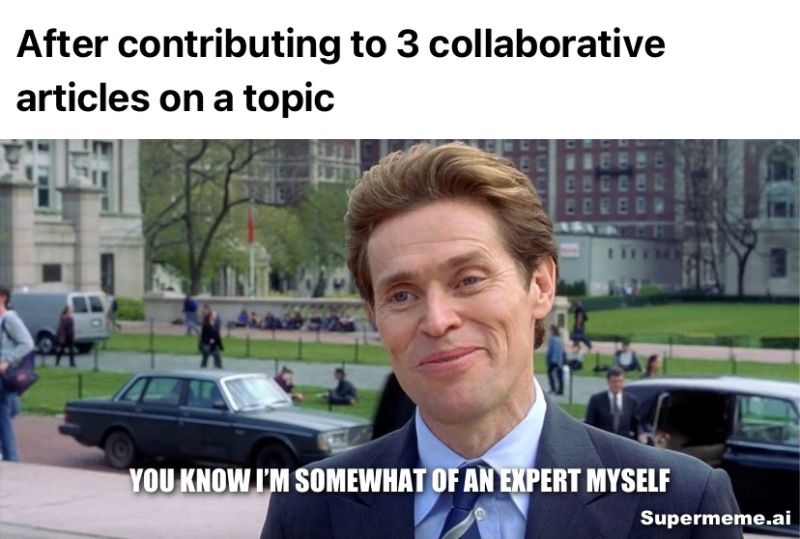
They’ve read advice that says as long as you’re one step ahead of your audience, that’s fine! They also use tips they find to build their authority and make it appear like they have more experience than they do.
Examples
Amelia has always been interested in nutrition and healthy eating, and recently became a vegan.
She decides to teach people how to transition to veganism. She creates an online course that she promotes as the best way to transition, and says it’s based on her extensive experience.
But she has no professional or academic history in nutrition, and her ‘extensive experience’ is solely based on her personal experience and the random recipe books, Tiktoks, and articles she’s used along the way. As a result when a pregnant woman asks whether she should become vegan now, while pregnant and then hopefully breastfeeding, Amelia does a quick Google, then gives her a confident yes. She encourages the woman to buy her course, even though it doesn’t have specific advice for the increased nutritional needs during pregnancy and breastfeeding.
Amelia simply doesn’t know what she doesn’t know, and she risks harming people by pretending she does.
Ingrid wrote a novel for NaNoWriMo, and she thinks it’s pretty good. She gets it edited and takes a few courses to learn how to self-publish on Kindle Unlimited.
It sells reasonably well, and she writes and publishes a second in the series. It also does reasonably well, and she’s now making a few hundred dollars a month. It’s not much, but it’s more than many authors who have self-published.
She decides to start consulting about self-publishing. She takes a very expensive course about starting a consulting business. It tells her to price high because then her clients will value her more and work for their results, so she adds premium pricing. They emphasise that she can learns as she goes. When she launches she uses carefully chosen screenshots of her income so she can display her best pageview and income stats. She’s very specific about the positives, and doesn’t mention the negatives. She uses FOMO and countdowns and limited spaces and false discounted pricing to create scarcity.
She sells a few places. Her client work starts off well, but it gets harder. They’re asking questions that she doesn’t know how to answer properly, and her limited experience is starting to show. Her clients aren’t getting the great results she promised. One drops out after two months and requests a refund, which Ingrid refuses based on the refund policy she copied from the course. This escalates into a dispute with Stripe and her bank, and causes a lot of stress. Another two stay for the full series of six sessions but don’t renew. In their feedback they say they really like Ingrid, but they’re disappointed with the results.
Faking it is great for you if….you know nothing, have no useful skills to share, and feel zero moral panic at the thought of being a fraud.
OK, OK, people who do this often aren’t THAT bad. They’ve just been misled, or sucked into some get-rich-quick scheme.
But faking it isn’t great for ANYONE.
Don’t do this!
If you have followed bad advice and you’ve been winging it, you’re not alone.
Unfortunately some people portray faking it as a legit option, and it’s easy to get sucked into their glitzy pressure-based marketing.
But now you know there are better options out there – go back through the list, choose another approach, and reposition yourself. Become a Journeyer, or Amplifier, or Curator, and earn as you help people AND move closer towards being an actual expert.
You’ll stop feeling like a fraud, you’ll connect with your audience much better, and you can finally be yourself instead of being constricted by how you think you need to act to fake being a pro.
It’s a really nice way to do business.
Combining content creation methods
You don’t need to choose one and stick to it slavishly!
For example, Quinn already had extensive knowledge of hiking. But they could have started as a Journeyer, sharing their hikes as they did them while building that knowledge.
Lucia, our sonographer, started off as a Curator. In future she could easily add a podcast or summit and Amplify others, and with her experience could be seen as an Expert or Thought Leader.
With my homeschooling site I was predominantly an Amplifier. I found homeschooling parents with specific knowledge, helped them to create workshops, and put them together into summits.
I also created courses and long-form blog posts from an Expert perspective, and shared email and social content from a Journeyer perspective.
So you can definitely mix and match content creation methods, or start with one and transition to another as your audience and experience grows.
Which content creator are you?
I hope that’s given you new ideas on how you can create fantastic content for your backpack business – please feel free to share your decision and ask questions in the comments below.
Having trouble choosing your business topic? My free Business Idea Blitz course walks you through brainstorming, weeding out, and choosing your profitable online business niche.
And sign up to my online business waitlist if you’d like structured, guided help to set up your own online business.
Pin if for later!
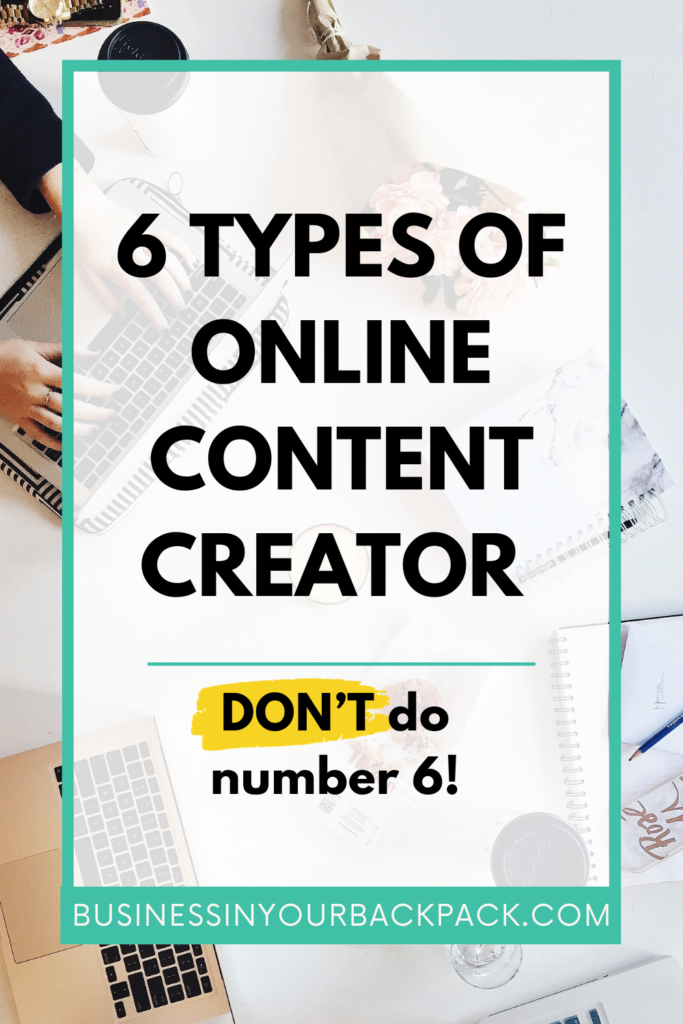

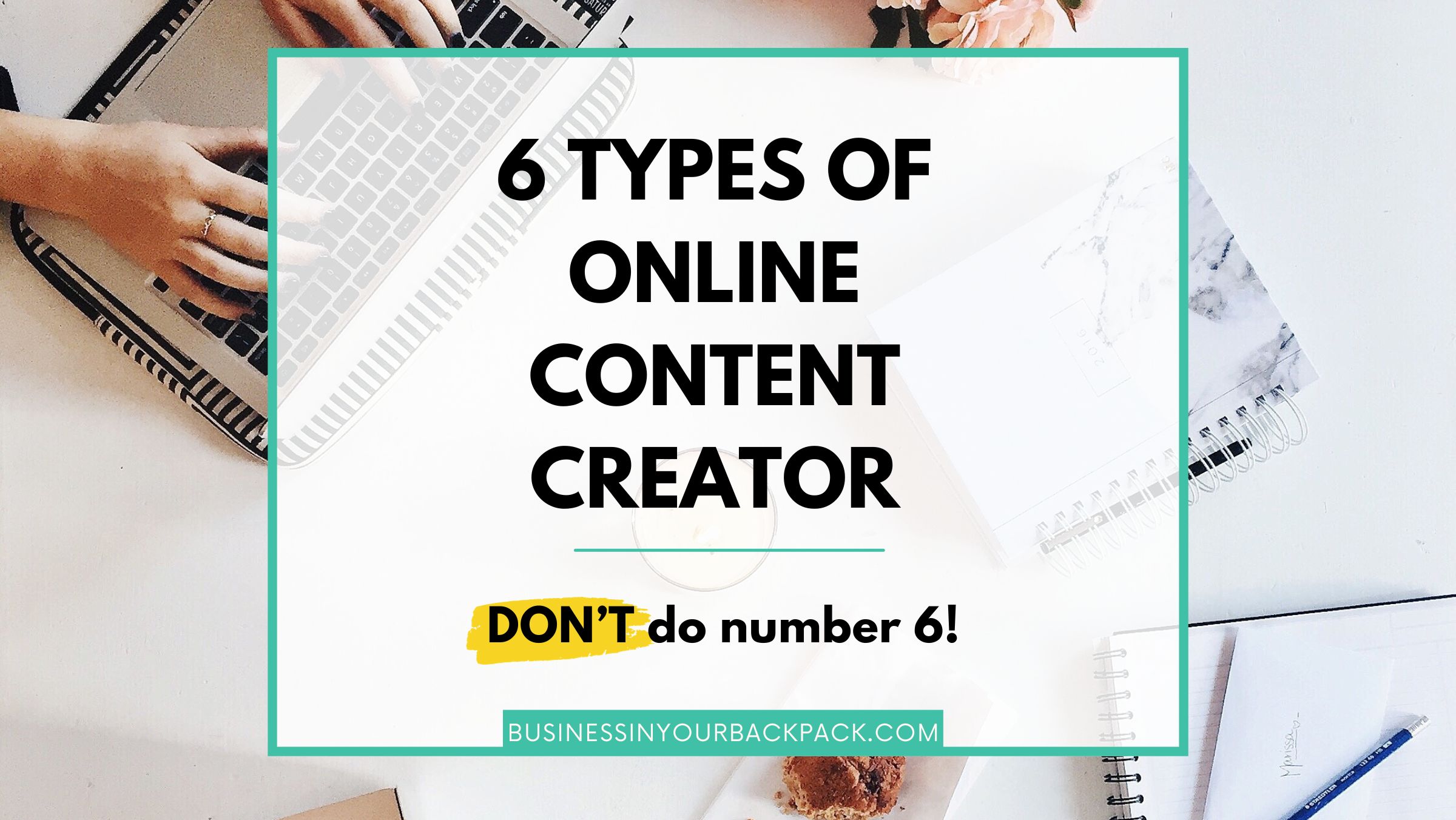
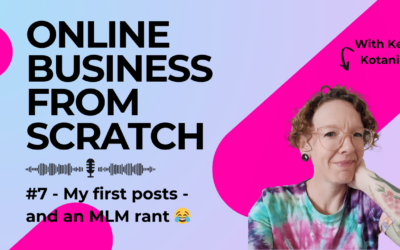
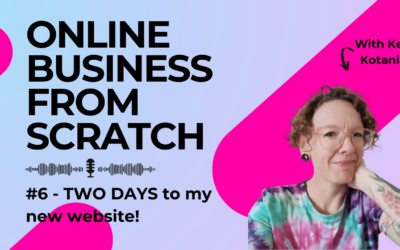
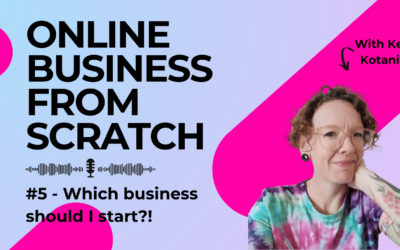
All of them! I think I can even be a faker from time to time, but it’s rare. I have to do a write up on Japanese food this afternoon (because of a free gift we were sent to promote) and I’m defo flying by the seat of my pants! But I’ll be an expert once I’m done researching. The expert is the expert in the room, no degrees required.
True! But you’re a chef, I imagine your food background allows you to do it a fair bit better than I could.
I mostly object to the people who have never really done what they’re teaching. Like online marketers who have never had independent success. Or people who know the very basics but nothing past there.
Plus people involved in health because that can be dangerous. Like Paleo Pete and his dodgy baby formula recipe. Winging it with stuff like counselling has had some terrible consequences.
This article was so helpful in getting me unstuck. I have been racking my brain about what I could blog about as I feel I’m not an expert in anything. This has shown me I don’t need to know everything. I love how you have used examples to make it more understandable too.
That’s so great to hear Esther! I’ve got another post with examples on the way, and you’ve given me a boost to get back and finish it.
This was really helpful Kelly. I had been stewing over the perspective from which I would write my content, so this has been a great reminder that being authentic in your level of experience is ok.
That’s great to hear Lauren!